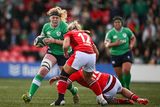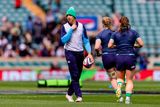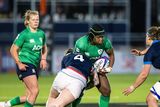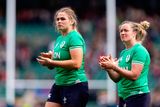Irish Slam hopes die in rugby's modern Babylon


It was as if you could hear the place ticking. For these gatherings of rugby clans, Cardiff takes the feel of a city with its collar a little crooked and eyes the colour of cinder. Stretched to the seams and swaying on that tightrope between hilarity and a loose incendiary spark, it becomes hopelessly congested and, on occasion, over-wrought.
But the best rugby stadium in the world sits at the bottom of Westgate Street and that is where the real danger looms.
With its cannon-fire, flame-throwers and great, boom-box acoustics and with its three, soaring tiers of men and women singing as if their children will go hungry should they stop, the Millennium is a bear pit into which only the steeliest of warrior should tread. Ireland, as it happened, had an abundance of that species on Saturday. Joe Schmidt's team was wonderful in many ways.
But they came up against a defensive force so fierce, so utterly impenetrable, a stray breeze wouldn't have danced in behind Sam Warburton's men.
SWIFT
Afterwards, Shaun Edwards - their defence professor - delivered swift, almost curt handshakes to everyone in the Welsh coaching box while, across the field, media - thumbing the match statistic sheets - cursed their task of trying to explain the unexplainable.
The tackle count caught the riddle in shorthand. For every one Ireland made, Wales made two and a half. That should be the arithmetic of slaughter. Yet it was only off Irish bodies that all the pain came rolling now, for they'd had just about everything to their game except precision. The quality Schmidt most covets.
And, of all the snapshots, one especially defined them. It came in the 66th minute, Ireland trailing 9-20, yet camped beneath the Welsh posts. The hosts' wide defence having been sucked into a havoc of bodies infield, Jared Payne and Tommy Bowe stood waving manically at a taxi that did not have its light on. Cian Healy took the ball short and knocked on.
Payne, diplomatically, attributed that aberration to the noise. "It was pretty loud out there and it was tough to get the message across," he sighed after. Schmidt might reasonably wonder if deafness was accompanied by an affliction of cataracts.
Still, perhaps we have lost the run of ourselves when a defeat of this nature gets placed on a Petri dish and picked into tiny pieces. Accuracy has to be the first casualty in a contest played with almost deranged intensity. Composure, invariably, the second.
Under Warren Gatland, Wales' games with Ireland have taken on a faintly sour, anarchic personality. The world seems to become a more cramped place when they meet now. Warburton spoke after of an "emotional build-up" that, palpably, soared some distance beyond a customary Six Nations preamble. And the Western Mail had turned Neil Francis's allusions to Gatland having the intellectual properties of a tub of margarine into a front page mock-up.
I suppose we have form in this regard. A few years back, this columnist was every bit as ungenerous in a chosen analogy for the Welsh coach. Perhaps we help crank the catapult ourselves.
Little enough of this will detain Schmidt, of course, for his is a forensic mind. Payne predicted a "tough" review from the coach, one that would be welcomed by his players. A peculiarity of the international game is an examination of each referee encountered. You don't play to the rules these days so much as one man's interpretation of them.
And, in 13 abject minutes, Ireland flunked the Wayne Barnes test.
As Leigh Halfpenny prepared to make it 12-0 for Jack McGrath not rolling away, Barnes protested to Paul O'Connell that his team was "doing it all the time". The Englishman has a reputation for favouring the attacking team at the breakdown. For those 13 minutes, he was faithful to it.
Up in the box, Schmidt looked as if a scorpion had gone scampering across his notes.
When Ireland did catch their breaths, they then spurned three penalty advantages before Warburton snaffled a Rory Best throw to the back of the lineout. Soon after, the Welsh captain was binned for ignoring Barnes' injunction to "move away" and you could all but hear the entire stadium murmur "big ten minutes coming". But nothing of consequence changed.
RESUMED
Six points down as Warburton walked, Ireland were still six down as he resumed.
When Schmidt got his team into the changing room, we have to assume he called for a few heads to be dipped into cold water. If so, no-one listened. Within five minutes of the resumption, Conor Murray was caught offside; Jonathan Sexton put a cross-kick out on the full and Simon Zebo spilled a George North cloud-scraper. Too many minds were short-circuiting now.
As Payne rather candidly put it: "It's about playing rugby under pressure and it gets to you!"
Trouble is, we had come to believe this Ireland team ate pressure between two baps, spitting out the gristle. We had fooled ourselves into seeing a nervelessness about them, the cold hearts of career assassins.
But chasing a game is different to manipulating it to your taste. Instead of directing things from a console, Sexton now found himself toiling in a sweatshop. Ireland began building phases like developers built houses in the boom, without much forethought. They criss-crossed the field, over and back, commentators counting each one with mounting disbelief.
Then, ruinously, the Welsh broke clear and - after their third lineout steal on an Irish throw - a long Rhys Webb pass tossed Ireland's midfield defence into confusion, Scott Williams swallow-diving over.
There was a time when self-pity might have been the preferred refuge in such circumstance but, with smoke coming out of the magnificent O'Connell's ears now, Ireland now laid siege on their opponents' 22. But they were running largely lateral lines from a playbook the Welsh seemed to have already read.
One sustained attack stretched to 32 phases. Imagine. It was a bit like ten hours in a trawler without catching sight of as much as a mackerel. Eventually, Sexton kicked to the corner and on it ran again - Ireland often inches from their quarry - until Barnes eventually called the penalty try. As he read the Welsh their rights, Sexton kicked the conversion.
But that was as good as it would get for Ireland. The Welsh were simply too tightly bound, too hungry for contact to allow any further daylight present itself. Afterwards, Schmidt expressed "surprise" at some of Barnes's decisions which, presumably, is as close as he allows himself come to dispensing public chastisement.
The bomb he dreaded had just gone off in Cardiff. Outside, the streets were returning to Babylon.
















